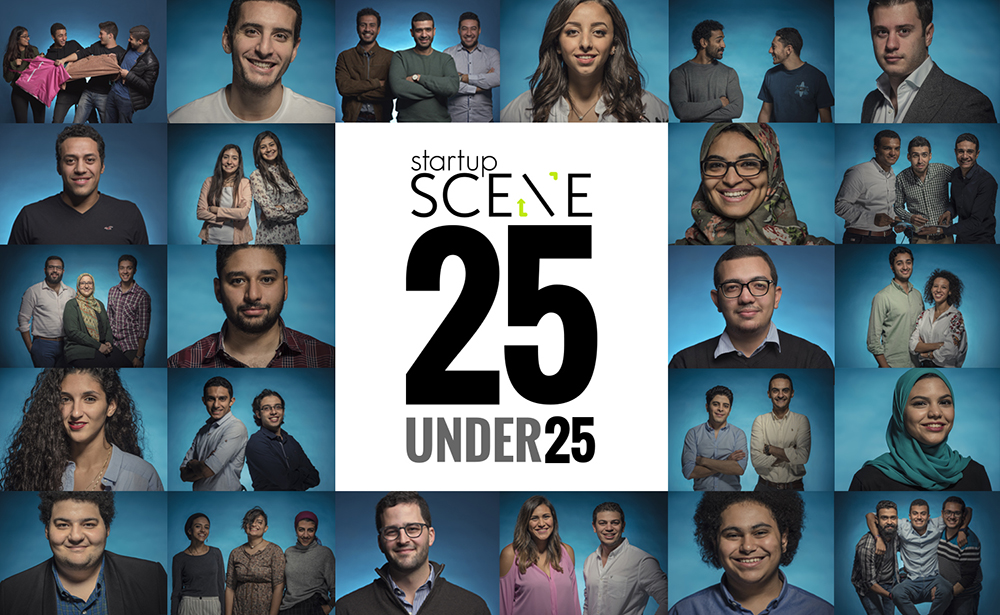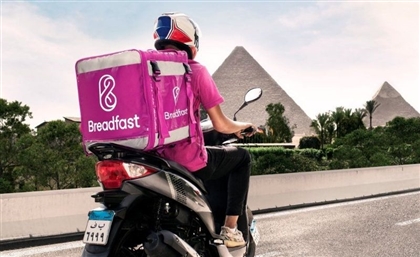25 under 25: The Young Entrepreneurs Reinventing Egypt in 2017
Envisioning brave new industries, tackling public transportation, and using AI to offer psychological help, Egypt's new generation of entrepreneurs knows no bounds. Meet the country's next gamechangers.

Reimagining realities, inventing the future and taking the reins of social and economic change, the youngest entrepreneurs driving Egypt’s startup movement don't let fear or failure get in their way. These audacious entrepreneurs are not only redesigning public transportation, rethinking healthcare, defeating the informal economy, and using Artificial Intelligence to offer psychological help; they are also asking the right questions. Is technology driving inclusion or creating a greater divide? Are chatbots replacing apps? What is the future of work? Are content creators becoming the stars?
Taking on immense challenges with both frontier technology - but also a radically innovative mindset - these young entrepreneurs, situated somewhere between Millennials and Gen Z, are not intimidated by tech giants or messy global markets. “We are privileged to be born and raised in Egypt, to understand its problems and solve them with technology, because when we go to other emerging markets, we have an advantage over other companies,” says Mostafa Kandil, co-founder of Swvl, as he anticipates his ambitious expansion plans.
This year, Startup Scene’s 25 under 25 not only includes startup founders, but also breakout talents steering the wheel of some of the country’s most powerful supporting organisations, from the power woman at the helm Cairo’s first angel investors network to the manager of Middle East’s largest startup event, RiseUp Summit. These are Egypt’s radical trailblazers.
1. Mostafa Kandil, 25, Mahmoud Nouh, 25, Ahmed Sabbah, 24 - co-founders of Swvl 
Their disruptive public transportation startup, Swvl, marked one of this year’s major headlines when it snagged a $500,000 deal with Careem, marking the regional giant’s fist investment in another startup. Launched in March 2017, the startup ballooned into a team of 36 in less than a year, completing 100,000 rides per month across Cairo and Alexandria. Now, as they gear up to enter other emerging markets, the restless entrepreneurs set off to launch in Pakistan and Saudi Arabia. “Everyone is competing for mobile real estate; to have a space in your mobile is the most expensive piece of real estate you can have, so you need to offer something of value in return. We are offering something of clear value for them to download the app,” Kandil says.
2. Saif Ahmed, 23 - founder of AzkarBot and co-founder of WideBot

A hundred million users are no challenge for Seif Amhed, whose chatbot Azkarbot racked up a whopping 70 million users, offering them psychological and emotional assistance through artificial intelligence. Aside from having created the Arab world’s largest chatbot, the entrepreneur is also co-founder of WideBot, the first bot-builder platform in the region, which was awarded the first prize at the Seedstars competition at theTechne Summit earlier in October. Founded in 2016, WideBot was incubated by TIEC and is now expanding to Dubai and Delaware, USA, in little over a year since its inception. With 25 clients under their belt and 100 on the pipeline - including Orange Egypt and Mc Donald’s UAE - the startup uses AI to create communities. “I don’t think chatbots are destroying apps,” he says. “In fact, 2017 is the year of integration; Swvl is integrating with Google maps, Uber is integrating with Spotify. These integrations make economies more connected,” says the entrepreneur.
3. Rania Ayman, 25 - founder of Entreprenelle 
Intrepid, fearless and sharp, young bosslady Rania Ayman seems to know no bounds. At 25, and in less than two years since founding her startup, Entreprenelle, she has hosted more than 70 workshops and five mega events across Egyptian governorates, striving to democratise the startup landscape and build gender balance. “I realised women are not aware of the resources to launch business, so they are not encouraged to do it. But I decided I can do something,” she says. A winner of the Injaz entrepreneurship prize and a member of AWID (Association for Women’s Rights in Development), Ayman is also a Global Shaper and has reached over 3,000 Egyptian women through her inspirational events, which are followed by 200,000 women seeking inspiration, resources, and support.
4. Mohamed Tawakol, 24 - co-founder of Spare

It was in September 2016 that Tawakol’s co-founder called him, while standing in line on a Cairo shop, frustrated and disappointed by the lack of change. “We have to do something about this,” he said. Their app, Spare, offers users an electronic payment method, which they can use by buying credit on their phone to pay services and products within the Spare network. Having entered the AUC V-Lab incubator last year, and with several retailers on board, the entrepreneurs are setting off to launch the app in the coming months. “In a country where only 1 percent of the population are active credit card users, but where there are 29 to 30 million smartphones, there is a huge chance to innovate,” Tawakol says. “In Egypt, the informal economy is 46 percent of the GDP, so there is a huge chance to innovate. If something like this takes off, it creates accountability across different sectors, and has huge social impact.”
5. Shourok Alaa El Din, 23, and Menna Moustafa, 22 - co-founders of Career 180 
Fighting one of the toughest battles in the Egyptian landscape, the female duo took it upon themselves to build an educational platform to equip students with the tools to build their professional careers. Their startup, Career 180, has reached over 7,000 students across different governorates in Egypt, through online and offline coaching sessions for graduates in 25 different sessions. Having recently won the Injaz Women's entrepreneurship competition as well as Injaz Al Arab, the entrepreneurs anticipate the biggest milestone yet, as they set off to create the Egypt Career Summit, in partnership with Cairo-based startup Career Advancers.
6. Sami Al Ahmad, 25, Abdallah Sami, 23, Ahmed El Gebaly, 23, co-founders of Marj3

A Syrian entrepreneur making waves in Egypt’s startup landscape, Sami Al Ahmad is now taking on the challenge of bringing international opportunities to students across the Arab world. After founding Khatwa, the network for Syrian students in Egypt, the entrepreneur partnered with Abdallah Sami and Ahmed El Gebaly to launch Marj3. “Year after year, we realised the problem was bigger than refugees; it was actually about the quality of education,” Al Ahmad says, recalling the inception of the startup, which connects people in the MENA region with scholarships, offering consultancy for students to be able to apply and success in securing scholarships.
Having reached 300,000 registered users, the startup has become the largest platform for scholarships in the region. “We created more than 60 events in Egypt, Algeria, and Lebanon for students to be aware about the existence of scholarships,” El Sami explains. The entrepreneurs were finalists in Facebook for Messenger Chatbot challenge, were awarded the second place at the Falling Walls global competition, and are now incubated by Flat6Labs Cairo.
7. Ahmed Omar, 24, founder of Odiggo 
His startup, initially called KasrZero, is a used-car automated marketplace that has amassed 7,000 products for sale on the site. “There are about 700 million car parts imported in the past 10 years in Egypt. Every year, 900 containers bring new car parts from China and other countries. But people don’t know whether they are original or not; and prices are not stable,” says the entrepreneur, as he explains the different tags he has implemented on his site. Entering a highly informal industry, Omar unveils a plan which includes adding services for people to install the car parts, instalments to make payments easier, and a partnership with Uber to offer drivers car parts. The entrepreneur kicked off bootstrapping, investing 40,000 EGP, part of which came from his previous investments in bitcoin.
8. Sara Gaafar, 20, Farah Emara, 20, Tasneem Amr, 21, co-founders of Jidar 
Art and business are not indissociable for these three audacious entrepreneurs, whose platform Jidar connects painters with wall owners, turning the city’s walls into a work of art. “Our greatest aim is to turn every wall into a canvas, since walls are the most practical kind of canvas,” says co-founder Sara Gaafar, who juggles her time between the startup and her job at Excuse My Content. Founded in February 2017, the startup has helped paint over 70 walls across restaurants, startups, co-working spaces and hotels, and boasts of a database of 110 artists and designers across Egypt. “There is a huge scalability index for this; there is a huge potential in the market, everyone is adopting it,” adds Amr.
9. Alaa Draz, 23, founder of Ayed

“We want to allow artists and content creators to depend on themselves and manage their own productions,” says Alaa Draz, whose platform Ayed enables content creators to engage directly with their audience, providing a gateway for artists and creators to interact and transact with their subscribers without depending on producers, distributors or resellers. “While Behance is a portfolio platform, we are more like Shopify, but geared towards subscription model to that musicians can offer their productions weekly and find new clients,” he explains. Incubated by Injaz Egypt, with a seed fund of EGP 150,000, the startup was born out of the belief that “free artistic and media expression can shape nations and develop societies,” if content creators are capable of reaching their consumers directly for sustainable revenue. “This is not the coding era as much as the content era. In this era, if you can code, you are good to go and can find universal jobs, but if you can create great content, you are also good to go,” he says.
10. Mohamed Ayman Thabt, 23, Mohamed Ayman Abd El-Hamid, 23 - co-founders of El Mawkaa

Hailing from Fayoum, the entrepreneurs came up with El-Mawkaa App - a platform that engages all construction industry stakeholders in one place - as they faced the challenge of finishing their own apartments. “As civil engineers, we faced shortage of suppliers, and it was very hard to get work done,” he says. “We want to engage all the construction market stakeholders in an online bidding system. If you have an apartment and you want to finish it, you can submit a bid, with the requirements, and contractors and engineers will start submitting their bids. All you have to do is to pick thee right person according to the rating,” he explains. Having entered the Injaz Egypt incubation programme, the entrepreneurs raised a EGP 150,000 seed investment, and have moved to the TIEC co-working space in Smart Village. With over 30,000 downloads and 1,000 daily active users, the startup has gained access to 10 countries in the MENA region, and are planning to launch an e-commerce track in the platform.
11. Shadw Helal, 22, founder of Rescue App

She’s a medical student, a blogger, and a valiant businesswoman tackling sexual harassment - with an app. Shadw Helal launched her startup inspired by a traumatic incident experienced by a friend in the streets of Cairo. Bold and sayy, the 22-year-old woman decided to turn frustration into a business idea, and launched her brainchild, Rescue App, a few months later. Having invested EGP 80,000 to kick-start the business, the entrepreneur launched the app for Android in October, and made waves across startup competitions, such as the Orange Startup Cup and IEEE’s app development competition in the Middle East. Recently, she entered AUC's Venture Lab’s pre-final round, and qualified for WeMena’s top 200 startups.
12. Hashem Merghany, 25, and Ismail Sabry, 23, co-founders of Cycliste
A dockless bikesharing programme in Egypt? Hashem Merghany and Ismail Sabry do not fear cultural barriers or traffic, as they set off to change practices in the Arab world’s most populous city. “There is a growing trend in fitness and cycling, but there are lots of challenges, the biggest one being changing the mindset and the culture. That’s why we are starting in gated communities, which will hopefully be our early adopters,” says Merghany. A sharing economy startup, the platform runs through a mobile application, which allows users to locate the nearest bike, unlock it through the app, ride the bike to their destination, and leave it without having to worry about its safety while bike owners, in turn, can create an extra source of income.
13. Dalia Kamar, 23, Riseup Summit Manager 
Just as the RiseUp summit concluded its fifth edition, the figure of a young, unstoppable woman came to prominence. Having joined the summit as a 20-year-old student, Dalia Kamar swiftly climbed the startup ladder, first as the company’s Marketing Manager, to later become one of the youngest managers in a startup event - while juggling her studies, and her role at the AUC’s Entrepreneurs Society. “Work structures have changed. I think people take the word experience too dramatically; they define it as a number of work hours, instead of considering what you’ve done to enable them to go beyond what they've expected,” says the young manager at the helm of the Middle East’s largest and loudest startup event.
14. Omar Gaballa and Ali Hisham, co-founders of Mezaj Kitesports

“We’re creating the first Egyptian kitesurfing industry. All of our equipment is inspired by iconic locations in Egypt, and we want to compete with global brands and make the sport more accessible in the country. We are already the cheapest brand in the world,” says Omar Gaballa, one of the members of the inspiring trio envisioning - and creating - a national kitesurfing industry.
With several kites already sold, the startup is setting off to compete with the 15 global brands hogging the market now. While kites usually cost between $1,500 to $3,000 in the global market, the Egyptian entrepreneurs sell the kites for prices ranging from $700 to $1,300. “For us, it’s about making the equipment more accessible for more people to have the opportunity to learn. For the past two years, Egypt has hosted the Kitesurfing world cup and the sport is soon going to be an olympic sport, so we want people in Egypt to be able to do it,” Gaballa says.
15. Menna Abdel Rahman, 25, Manager of Cairo Angels 
Since its launch in 2012, Cairo Angels has invested over $2.2 million in startups across six cities in Egypt and the Middle East. At the helm of it all, there is a talented 25-year-old young woman who has taken it upon herself to manage and coordinate the network, from Cairo to London. Working alongside Chairman Aly El Shalakany, the young General Manager has been heavily involved in supporting entrepreneurs across the Arab startup ecosystem, and has been invited as a panel member in pitching competitions including Arabnet, Betapitch Cairo, and MO4 Network’s Undergrad Startup Challenge.
16. Ghada El Tanawy, 24, and Amr Diab, 25, co-founders of La Reina Exchange
 The founders of Egypt's first online e-commerce platform for designer dresses, Ghada El Tanawy and Amr Diab launched La Reina Exchange, initially for former brides to be able to rent their designer gowns. The platform today not only helps past brides gain up to 40 percent of their original investment, but also connects users with used designer gowns, featuring famous designers, including Elie Saab, Hany Elbehhairy and Maison Yeya. Having won the RiseUp Explore competition in 2016, and reached the finals at the Womena competition, the entrepreneurs are running their first startup, having kicked off early with an internal tourism online map, and 7blues, an entrainment complex in Egypt’s North Coast.
The founders of Egypt's first online e-commerce platform for designer dresses, Ghada El Tanawy and Amr Diab launched La Reina Exchange, initially for former brides to be able to rent their designer gowns. The platform today not only helps past brides gain up to 40 percent of their original investment, but also connects users with used designer gowns, featuring famous designers, including Elie Saab, Hany Elbehhairy and Maison Yeya. Having won the RiseUp Explore competition in 2016, and reached the finals at the Womena competition, the entrepreneurs are running their first startup, having kicked off early with an internal tourism online map, and 7blues, an entrainment complex in Egypt’s North Coast.
17. Ahmed Saad, 24, co-founder of E-nable Egypt

“We want to empower people with disabilities, by involving them in the process of creating their own assistive devices,” says Ahmed Saad, one of the entrepreneurs spearheading the launch of E-nable, the international non-profit that provides people with an opportunity to create their own assistive devices using 3D printers, at FabLab New Cairo. “One of our co-founders, Omar Ayman, was introduced while studying in Massachusetts and asked if he could open a chapter in Egypt, which turned out being the first Middle Eastern chapter. We added R&D and psychological studies to empower people to tackle the challenges related to the acceptance of people with disabilities,” Saad explains. The organisation, founded by Saad along with Ayman, Omar Hegazi and Youssef Galal, has so far delivered 12 prosthetic arms, three of which were sent to Syria. “We are collaborating with a Turkey-based organisation called Heroic Hearts, who called us to send them devices for people who were injured in Syria,” the entrepreneur says.
18. Amr Mashaly, 25, and Yasmine Helmy, 23 - managers of Hult Prize Egypt 
The two young “intrapreneurs” are steering the world’s most powerful competition for undergraduate social entrepreneurs: the Hult Prize is a start-up accelerator for impact entrepreneurship, which calls on the brightest college and university students to solve the world’s most pressing issues. Both juggling with other startups - Mashaly is launching his travel startup, while Helmy works as a growth marketer at Instabug - the duo kicked off the AUC center that spearheaded the launch of the competition across 30 university campuses in Egypt. “This year we have 30 campuses and each campus has around 10,000 students in total, 10 percent of which compete for the prize,” Helmy says. Managing and coordinating events in cooperation with organisations like the USAID and the British Council, the entrepreneurs are focused on bringing the $1 million competition to all corners of Egypt, from Assiut to Minya.
19. Mostafa Ashraf, 19 - founder of Advice Seekers

“My best friend committed suicide because of bullying, so I took it as a message to start an organisation in her memory to end bullying,” says Mostafa Ashraf, who turned a traumatic experience into an inspiring initiative to spark social change, tackling an issue overlooked across schools and universities: bullying. Having launched his organisation, Advice seekers, in 2014, the young change maker visits between 12 to 22 schools per year, giving training sessions, from Cairo to Alexandria, where students talk about their emotions and interact with the students. “The experience made me wake up and be aware that bullying is a problem in the world; so I made up a team and we try to raise awareness in bystanders as well, because they are the people that will end up bullying,” says Ashraf, who has garnered a network of 45 volunteers.
20. Abdalla Amin, 22, Omar Ibrahim, 23, Emad Zowail, 23 - co-founders of FlareInn 
It all started with a comic book, Amin says. “We wanted to enter a competition, but we didn’t make it,” he recalls. However, publishing the comics opened doors to new possibilities, as many users began to ask if the drawings were for sale. “That got me thinking, what if we could have an online platform that helps mature artists sell their paintings?” He says. Having sold four paintings since its launch, the platform allows artists to create a profile and sell their artworks - categorised by mood, theme - online.
21. Moody Boles, 16, founder of Imaginators 
His first startup pitch was as impressive as it could be: a startup founded by a 16-year-old student had amassed clients from 24 countries in its first month. The young innovator saw a gap in the creative industry, as there was no place where designers and artists could showcase their skills with customised presentations, without acquiring programming or design knowledge. His user-friendly platform, Imaginators, features a drag-and-drop design, which makes it easy for users to create dynamic portfolios in minutes, without any technical challenges. Boles launched the startup at the Riseup Summit 2016, and recently won the MO4 Network media startup competition at the Techne Summit.
22. Mark Ragaee, Norhan Hamdy, Ahmed Hachem - co-founders of Dormee 
Roomates in Egypt? Why not? Said Norhan Hamdy, as she geared up to launch the first platform for students to find apartments and roommates online. "We help students find roommates in a fully-automated way,” she explains, unveiling the platform and app, were students can choose to rent an entire apartment or share one. “It’s mainly for expats but for the first year we are just targeting university students to see how things work out, we take half of the first month from the transaction,” Hamdy explains.
23. Raymond Lakah, 19, founder of Ya Doctory 
“Home health care is a huge missing part in the health care market, especially for people who have cancer or chronic diseases,” says Raymond Lakah, a young entrepreneur who was born into a family of physicians. His startup, Ya Doctory, is Lakah’s take on the health industry in Egypt, adding tech and a Millennial approach to his family business. “In Egypt, you go to the hospital to be treated, then you go back home, where you won't have a proper recovery experience, so you'll go back to the hospital, and so on,” he explains. "Ya Doctory gets patients out of the hospital and stays with them at home,” a move that lowers the cost for both the hospital and the patient, and improves the quality of health care,” explains the young entrepreneur, whose startup as treated over 500 patients in 10 different specialties.
24. Riad khawam 17, Shivani Pillai, 17, Fadi Tawfik 15, Hashem Abdou 16 - co-founders of Zip and Flip.
The team of teenage entrepreneurs made waves at the Injaz Al Arab competition, battling 14 other Arab nations and taking home two prizes for their innovative beach product: an impermeable bag that turns into a towel. “Summer in Egypt is such a big deal and everyone goes to the beach, so we thought: what is the problem that people face when going to the beach? So we came up with Zip and Flip,” says co-founder Hashem Abdou. Within just one month of launching the startup, the bags made EGP 40,000 in revenue its founders, which later jumped to EGP 70,000 sold at he Cairo American College, which the students attend. “We were making the bags through tailors, but we’ve now extended to factories so we can create more,” the entrepreneurs say.
25. Ahmed El Said, 21, founder Canzopekia
Recycling one aluminium can should save energy equivalent to half a gallon of gasoline; especially in Egypt, which depends on the production of aluminium by importing Bauxite. Focused not only on the environmental impact of recycling, but also the macro-economic consequences, Ahmed el Said created Canzopekia, an initiative setting off to recycle cans into aluminium that was incubated by Injaz Egypt. Having received a seed fund of EGP 200,000, the startup aims to reduce the tremendous cost and energy to produce cans in Egypt - the country’s Bauxite imports increased by 108.6 percent between 2011 to 2015.
Photos by @MO4Network's #MO4Productions.
Photographer: Ahmed Najeeb.
Retouching: Amr Salama.
- Previous Article Bassita: Click Funding for a Better Egypt
- Next Article Bayzat's CEO Explains Why Automation is Vital - Even When Your Startup is Small




















